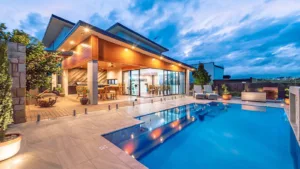Introduction
When it comes to creating the perfect poolside oasis, choosing the right material for your pool deck is crucial. A well-designed pool deck not only enhances the aesthetics of your outdoor space but also ensures safety and durability. In this article, Unicomposite composite profiles will explore the pros and cons of three popular pool deck materials: fiberglass, concrete, and wood. By the end, you’ll have a clear understanding of which material suits your needs best.

fiberglass pool deck
Fiberglass Pool Decks
Pros of Fiberglass Pool Decks
Fiberglass pool decks are gaining popularity due to their remarkable benefits, including:
- Durability: Fiberglass is incredibly strong and resistant to wear and tear.
- Low Maintenance: Easy to clean and requires minimal upkeep.
- Safety: Its non-slip surface provides a secure environment.
- Aesthetic Versatility: Available in various colors and textures to match your style.
Cons of Fiberglass Pool Decks
However, there are some downsides to consider:
- Installation Cost: Initial setup costs can be higher than other materials.
- Limited Customization: Fiberglass decks offer fewer design options.
Concrete Pool Decks
Pros of Concrete Pool Decks
Concrete pool decks have been a classic choice for years, and for good reason:
- Cost-Effective: Concrete is budget-friendly and offers good value.
- Customization: You can achieve a wide range of designs and finishes.
- Longevity: With proper maintenance, concrete decks can last for decades.
Cons of Concrete Pool Decks
But they also have their drawbacks:
- Cracking and Repair: Over time, concrete can develop cracks that require maintenance.
- Heat Absorption: Concrete can become uncomfortably hot on sunny days.
Wood Pool Decks
Pros of Wood Pool Decks
Wooden pool decks lend a charming and natural appeal to your pool area, and they come with advantages such as:
- Aesthetic Beauty: Wood decks exude warmth and elegance.
- Comfort: Wood stays cooler underfoot on hot days.
- Customization: You can choose from various wood types and finishes.
Cons of Wood Pool Decks
However, wood has its limitations:
- Maintenance: Regular sealing and staining are necessary to prevent rot and deterioration.
- Lifespan: Wood decks tend to have a shorter lifespan compared to other materials.
Making the Right Choice
With these considerations in mind, your choice of the best material for a pool deck should align with your preferences, budget, and long-term plans. Fiberglass is ideal for those seeking low maintenance and safety, while concrete provides versatility and affordability. Wooden decks are perfect for those who prioritize aesthetics and are willing to invest time in maintenance.
Conclusion
In the quest for the perfect pool deck, you’ll need to strike a balance between aesthetics, durability, and maintenance. Each material has its unique features, making it essential to evaluate your specific needs and circumstances.
If you’re looking for more information and guidance on pool deck materials, be sure to explore other articles on our website. We’re here to help you create your dream outdoor space.
FAQs
1. Are fiberglass pool decks really slip-resistant?
Yes, fiberglass pool decks are known for their non-slip surface, making them a safe choice for pool areas.
2. What is the average lifespan of a concrete pool deck?
With proper maintenance, a concrete pool deck can last 25 years or more.
3. Do wood pool decks require a lot of maintenance?
Yes, wood pool decks need regular sealing and staining to prevent rot and prolong their lifespan.
4. Can I install a wooden pool deck in a humid climate?
Wooden decks can be installed in humid climates, but they require extra care and maintenance due to the increased moisture.
5. Which material is the most budget-friendly for a pool deck?
Concrete is generally the most budget-friendly option for a pool deck.




























